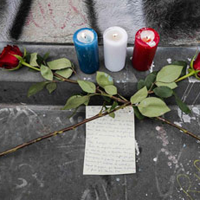
Terrorism
In the Wake of Terrorist Attacks: A Call for Introspection
by Marc-André Cotton*—Int. Psychohistorical Association
This article was published in Psychohistory News, Vol. 35, No 1, Winter 2016.
Abstract: Terrorism brings back deep memories of childhood abuse. Awareness of this phenomenon can help reduce unconscious sources of popular support for repressive and militaristic government policies in the wake of terrorist attacks. These reflections by the IPA’s International Vice President were composed in the weeks after the November 13 Paris attacks.

In the aftermath of the November 13 mass shootings, many in France felt relieved when President Hollande declared a state of emergency and sent planes to bomb ISIL in Syria. A reflexive response to the attacks was to rally behind the tri-color flag and the values of the Republic, to draw closer to our leaders in search of reassurance. As criticism arose over unlawful security measures in the wake of the tragedy, I thought about an unconscious process that may be at play in such painful moments.
Responding to Political Violence
When we face an event that temporarily overwhelms the response capacity of our reflective consciousness, a splitting mechanism operates. Our brain cannot integrate the disturbing information and the emotional trauma associated with it. This was frequently described as a “state of stupor” on the evening of the November 13 Paris attacks. A constructive way of processing such events is to share one’s experience with others and to show support through social networks. In this case, for example, #PrayForParis hashtag broke records on Twitter.
This spontaneous reaction may have stemmed from an overwhelming anxiety rekindled by the peculiar ferocity shown by the attackers, urging those affected to find consolation and a sense of togetherness in a few powerful symbols. Identification of the French people with the victims seemed even stronger than occurred after the Charlie Hebdo attacks in January 2015, which were directed towards specific targets. I and those I know liked the music played at the Bataclan concert hall and could easily imagine ourselves on the terrace of Rue de Charonne.
Such responses are natural, but I see two reasons to go deeper. First, only through introspection can we avert popular support for abuses of power that are often perpetrated “in our name,” ostensibly in the service of national security. France in fact has opted out of some aspects of the European Human Rights Convention in order to fight terrorism, and French authorities have raided mosques and the homes of environmental protesters. Unexamined fears enable such excesses. The second reason has to do with personal integrity and the necessity to free ourselves from our inner limitations.
Confronting the Terrors of Childhood
Perhaps the most terrifying experiences of childhood are those associated with parental violence. It is common for such terrors to be repressed and then triggered in adulthood by dramatically violent events such as the November 13 attacks. To the extent we remain unconscious of such childhood traumas, it is easy to displace our fears onto scapegoats and find false reassurance in irrational and dysfunctional security policies. But there is an alternative. When political violence evokes childhood terrors, tragedy can become an occasion for personal growth through introspection.
The key to introspection in this context is to recognize how our adult responses to horrific political violence are shaped by our traumatic memories of parental violence. In both cases, there is a sense of disbelief before reality sets in. How can this be possible? There was a relative confidence and, suddenly, everything seems to be turned upside down. We are shocked and puzzled by terrorist attacks just as we were shocked and puzzled as children in the wake of parental violence. Terror becomes real through our bodily sensations: our heart is now racing and apprehension takes over.
Emotions in the wake of a terrorist attack are overwhelming. We must understand what has happened, but how can we possibly make sense of such unbounded hatred? Feelings of helplessness in the hands of indiscriminate violence soon give way to anger seeking compensation for our loss. Any sense of the assailants’ humanity is overwhelmed by the urge to strike back, to harm or kill to put an end to such evil. But just as we once hit the wall of our own intractable parents, now too a truly effective response eludes us, and a sense of numbness sets in.
In the weeks following the attacks, we experience a train of emotions, undoubtedly intensified by alarming press statements and untiring reminders of the crimes. We feel powerless and enraged, just as we did as children, and at other times feel unfathomable sorrow. Our efforts to make wise political judgments about the current terrorist threat are held hostage to an inner turmoil having its roots in the terror we experienced as children. We survived that terror through repression, but now the old psychic wounds resurface. Only by reflecting on the sources of those wounds can we achieve personal healing and political sanity.
Marc-André Cotton*
© M.A. Cotton – 03.2016 / regardconscient.net
*Marc-André Cotton, MA, the President of the International Psychohistorical Association, and an International Member of the Psychohistory Forum, is a teacher, independent scholar, and director of the French website Regard conscient, dedicated to exploring the unconscious motivations of human behavior. He authored the French psychohistorical book Au Nom du père, les années Bush et l’héritage de la violence éducative published in 2014 by L’Instant présent (Paris).
